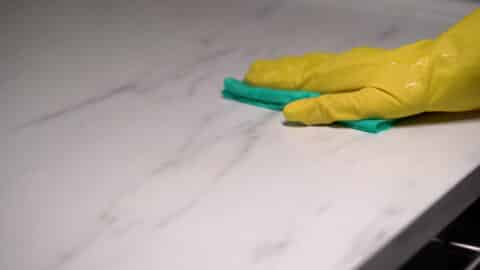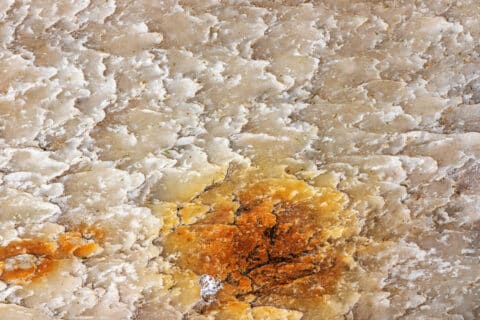How to Remove Stains from Marble Countertops
Marble is a luxurious stone known for its timeless beauty. It has become a popular choice for kitchen countertops and other applications because of its usability, durability and lavish aesthetic. However, marble countertops require additional maintenance compared to other natural stones in order to preserve their pristine condition. Marble countertops can be susceptible to staining if not given the proper upkeep.
Marble countertops may or may not be practical for your space depending on your needs and expectations. It’s important to consider the space and function of your marble countertops and common types of stains that can permanently alter their appearance such as:
- Oil stains
- Organic stains
- Rust stains
- Water stains
Understanding Marble
Marble is a metamorphic rock with subtle and random veining. Slabs are often predictably white or light in color with streaks of gray. The subtle detail gives a clean and elegant look that can upscale any room or space.
One should be aware of the inherent properties of marble before selecting it for high-traffic areas such as kitchens or bar areas. Typically used in bathrooms, marble is a softer and more porous stone that can be easily scratched and susceptible to common, mild acids and liquids. Due to its natural composition and porosity, any substances should be removed promptly from the surface to avoid stain damage.
General Tips for Stain Removal
 In general, any liquid or substance that comes in contact with your marble countertop should be wiped immediately. This will reduce the chances of it breaching the surface and creating a deep and permanent stain. The longer the spill sits, the more likely it will stain or etch your marble countertops. If a stain does appear on your marble countertops, there are steps you can take to remove it.
In general, any liquid or substance that comes in contact with your marble countertop should be wiped immediately. This will reduce the chances of it breaching the surface and creating a deep and permanent stain. The longer the spill sits, the more likely it will stain or etch your marble countertops. If a stain does appear on your marble countertops, there are steps you can take to remove it.
First and foremost, you should identify the cause of the stain for an appropriate treatment. Depending on the severity of the stain, there are some simple at-home remedies that can be used on it. In most cases, an at-home poultice solution using household products can be successful in lifting many types of stains. The base of the poultice solution can depend on the type of stain, so it’s important to know the source of it.
When wiping a spill, you should be cautious of the types of cleaning products being used. Many cleaning agents have lemon or acidic substances that are harmful to your stone and can even worsen the stain. Marble countertops should always be cleaned using a neutral pH soap and water mixture or a stone-intended cleaner. Avoid using any abrasive cloths or sponges that can cause scratches to softer stone such as marble.
When removing any type of stain, you should pick a small area to test. This will reduce the risk of spreading the existing stain or creating new stains. If the test area successfully lifts the stain without further harming your marble countertops, it is safe to apply the treatment.
Removing Oil Stains
Oil-based stains can be recognized as dark pigmented spots that discolor the stone. These can be caused by substances containing oil or grease. Oil stains may be more common in kitchen areas, so precautionary measures should be taken to avoid them. The stain may not be recognizable at first, but will darken the marble over time.
When cleaning an oil or grease spill, you should use an absorbent cloth and stone-safe degreaser cleaner. A stripper or degreaser can also be used to replace the peroxide in a poultice recipe for stain removal.
Removing Organic Stains
Organic stains are created by food, beverages and cosmetics. Acidic or citric foods such as spaghetti sauce, lemons or tomatoes can be harmful to marble countertops. Using a cutting board is important when preparing food to reduce the risk of food stains. Certain beverages, such as wine, can be extremely harmful to marble countertops. Coffee and tea are also common sources of organic stains and should be wiped promptly when they come in contact with your kitchen countertops.
These stains can often be identified as pigmented spots or patches in the stone. The size and source of the stain can impact the severity and color of it and the ability to remove it completely. When removing organic stains, a simple poultice consisting of hydrogen peroxide and baby powder is the best approach.
Removing Rust Stains
Rust stains can result from metal objects left on the marble, especially in humid or moist environments. If the object begins to rust, it can easily transfer to your marble countertops. It is best to use a trivet or mat to place metal objects on.
A rust stain can be identified as leaving a brownish or orange spot behind. If a rust stain appears on your marble countertops, begin by cleaning it with mild dish soap, water and non-abrasive cloth. If the stain persists, try using vinegar or a baking soda and water mixture, applying it directly on the stain and gently work to wipe the stain away. Other options for more stubborn stains include hydrogen peroxide or a commercial rust remover such as Iron Out in a poultice solution.
Removing Water Stains
 Water stains are not uncommon when it comes to marble countertops. There are many potential causes of water stains, including condensation, water rings left behind by glasses or bottles, and leftover moisture from cleaning. When water sits for an extended period of time, it will create a stain that is milky in appearance. Quickly remove any water left on your marble using a soft, absorbent cloth to avoid staining.
Water stains are not uncommon when it comes to marble countertops. There are many potential causes of water stains, including condensation, water rings left behind by glasses or bottles, and leftover moisture from cleaning. When water sits for an extended period of time, it will create a stain that is milky in appearance. Quickly remove any water left on your marble using a soft, absorbent cloth to avoid staining.
Water may presumably seem harmless; however, water stains can be some of the most difficult stains to remove. When attempting to remove a water stain from your marble countertops, start by applying a marble cleaning solution using mild pressure to wipe the area.
If unsuccessful, deeper water stains may require a more aggressive approach. Try using baking soda or marble polishing powder and gently rub the area. If these techniques do not work, consult with a professional for advice and an appropriate water-stain treatment.
Preventive Measures
The use and space for your marble countertops can influence how much maintenance is needed. High-traffic areas will require extra care and preventative measures to reduce the chances of staining.
The most important preventative measure that should be taken to protect your marble countertops is applying a high-end sealant. A stone sealant acts as a protective barrier by filling in pores and fissures that can easily absorb liquids and other harmful substances. Marble countertops should be sealed prior to installation and resealed each year to reinforce the effectiveness of the sealant and reduce the risk of staining.
Developing a daily maintenance routine for your marble countertops will keep them in their best condition. Cleaning your countertops daily with a neutral soap and water will help remove anything left behind, including dust, debris or moisture. Wiping spills and messes immediately is important to ensure a stain does not appear over time. The longer a spill sits, the more dangerous it can be to your marble countertops. A stone polisher that is safe for marble will enhance the beauty of your countertops and add an extra shine.
Protective measures against future stains should be taken and include using cutting boards, mats and trivets as a way to reduce repeated exposure or direct contact with harmful liquids, substances and objects. Try to identify potential sources for stains before they occur so that stain removal is not required.
Marble’s susceptibility to staining makes it important that you understand the best method to treat the specific types of stains impacting your countertop. Depending on your willingness to put in extra care and maintenance, marble countertops can be the perfect option for your space.
Granite and Marble Designs Can Help
If a stain is difficult or impossible to lift on your own, it may require the help of an industry professional. Granite and Marble Designs has the tools and expertise to help identify the source of a stain and a proper way to treat it. We offer restorative services for marble countertops to ensure they maintain their beautiful, natural appearance.
Meet with one of our design consultants to help you decide whether marble is best the countertop option for you. Call Granite and Marble Designs at 303-551-6000.
